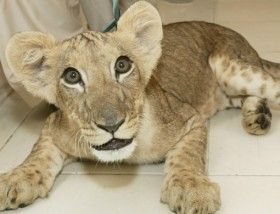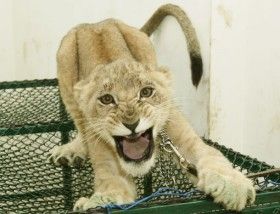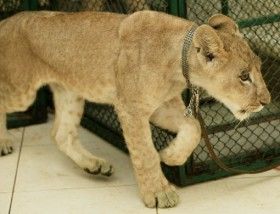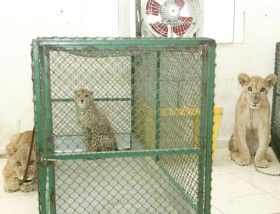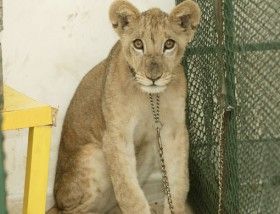Dubai: The UAE law does not allow wild and protected animals such as lions to be kept as pets, officials from the Ministry of Environment and Water have said.
Animal and wildlife centres across the UAE yesterday criticised the conditions in which five lions and one cheetah were being kept in a residential one-bedroom flat in a northern emirate, as reported by Gulf News.
Valid permits for the importation of protected species and tighter controls on where these animals end up must be investigated, said a number of wildlife groups.
Dr Mohammad Saeed Al Kindi, Minister of Environment and Water, condemned the place in which the animals are being kept. "They are not supposed to be there, they are wild animals. They are protected species," he said.
Not the right place
An official from the ministry added that it is important for animals to be handled in the right way. "It may not be the right place for them but without inspecting the area and checking relevant permits I cannot say at this stage until we send an inspector. We have to check the safety of the situation but the law is the law," he said.
Lions are listed in appendix 1 and cheetahs are listed in appendix 2 of the Convention on the International Trade in Endangered Species of Wild Fauna and Flora (CITES), an international agreement between governments. Its aim is to ensure that international trade in specimens of wild animals and plants does not threaten their survival. The UAE gained accession to CITES in 1990.
Ronel Fmuts, Director of the Abu Dhabi Wildlife Centre, expressed concern over the big cats and the conditions in which they are being kept. "We are working hard to promote conservation of species. Taking care of big cats is a big responsibility. You cannot keep them as pets. Tighter control should be the agenda of the day. We want to know what will happen to them," she said.
Paul Vercammon, operations manager at the Breeding Centre for Endangered Arabian Wildlife, part of the Environment and Protection Areas Authority in Sharjah, said CITES permits were not given to private individuals.
He said the centre focuses primarily on Arabian species and no lions are bred at the centre. "The only lions that we have had were animals that were previously confiscated. If we could we would send them back to their countries of origin but it is never clear what their origins are," said Vercammon.
Infancy
Vercammon said that every year controls were improving at air and sea ports, but the legislation is in its infancy. "Seven years ago we had a great number of cheetahs that were confiscated but this hardly happens now. The regulations are stronger," he said.
Speaking on the photos published yesterday in Gulf News, Vercammon said the lions and especially the cheetah looked absolutely terrified. "They can't move in such a limited space. Even the question of pulling their claws and teeth is a really serious crime in Europe. Not to mention that it leaves the root canal open and the teeth don't grow back," he said.
Animals held in captivity can only be released with other captive held species. "If they mixed with other wild lions they just wouldn't survive ... they have no way of defending themselves." he said.
His view: Animals will be moved to farm soon, says keeper
The owner of the flat where five lions and one cheetah are being kept said they would be making their way to a spacious farm after two days. He said he has valid CITES permits.
"This is legal, we have the permits. Why would anybody create such a problem for themselves?" he said adding that he was not the owner but one of the carers of the animals.
"I don't know how they came to the UAE. I'm not the owner but they have come from abroad. When we got them from a zoo they already had their teeth and claws removed," he said.
"These animals are treated very well. They sleep better than you, they eat better than you. They have fresh meat everyday, expensive meat, one sheep everyday. They only stay in the flat for two days," he said.
He said the animals were brought to the flat to be cared for and have their diets checked.
International Convention
Endangered animals are protected by CITES, an international Convention between governments to protect the International Trade in Endangered Species of Wild Fauna and Flora.
Appendix I (1) species are rare or endangered. Trade in these species for primarily commercial purposes is prohibited. As a result, Appendix 1 species must be accompanied by a CITES export permit issued by the exporting country and a CITES import permit issued by the importing country.
Appendix II (2) species are neither rare nor endangered at present, but could become so if trade is not regulated. The species in Appendix II must be accompanied by an appropriate CITES export permit issued by the exporting country before entry to the importing country will be allowed.
Captive cats evoke mixed reaction
Gulf News readers reacted strongly to the report about wild cats kept in a flat.
Harjot from Dubai said: "I have no words to express my shock at the role of the authorities in this regard … It will be interesting to know how they were imported into the country.
Anil from Sharjah wrote: "It's ridiculous and high time the concerned authorities take the necessary action and shift these wild cats back to their natural habitat.
Hanzala from Abu Dhabi has a different view: "This is great. I would also love to have such pets as I love animals too. But it should be outside the city at your farm house," she said.
Joy from Nairobi wrote: "The custody of big cats by people is interesting. It's really fun and should be allowed legally to have them, provided people have the basic facilities at their disposal."


